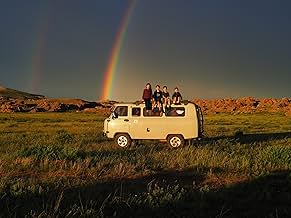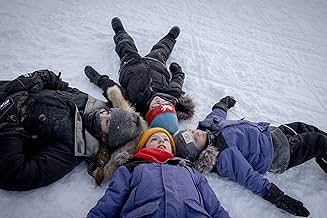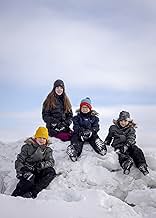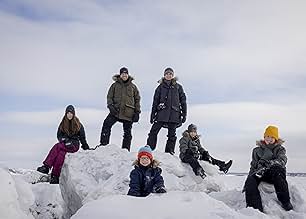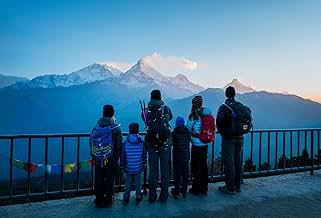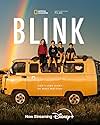PUNTUACIÓN EN IMDb
7,2/10
741
TU PUNTUACIÓN
Añade un argumento en tu idiomaChronicles a family's global trip before their children lose vision to a rare genetic disorder, capturing their journey to experience the world's beauty while they can still see it, and prep... Leer todoChronicles a family's global trip before their children lose vision to a rare genetic disorder, capturing their journey to experience the world's beauty while they can still see it, and preparing for an inevitable future.Chronicles a family's global trip before their children lose vision to a rare genetic disorder, capturing their journey to experience the world's beauty while they can still see it, and preparing for an inevitable future.
- Premios
- 3 premios y 4 nominaciones en total
Reseñas destacadas
I travelled the world for a year with my son when he was 3 months old. I travelled the world with him since then and met a few other families that travel with their children and sometimes home school them. I think it is the best gift and education to give them. When we see the beauty and diversity of the world we learn to be happy with less. We learn to see less differences and divisions. We also remember our role, our mortality and the smallness of our local thinking.
This film explores these themes including the fear of losing our sight from illness. 3 out of 4 kids are already losing their sight and cannot see stars or well at all at night. This National Geographic doc explores the world with stunning footage from Egypt, Ecuador and Nepal among others. More importantly, it exposes the family dilemmas and joys. Their quest to live a bucket list now and not wait until it is too late. A reminder we should all have.
The editing and storytelling are superb and many intimate scenes bring these profound questions to light with lightheartedness. How to accept the difficult. How to accept illness (and even death) with courage, kindness and love.
A beautiful scene in a dessert sunset has the mom and daughter on a sand dune try to imagine traveling with no sight. Can we still connect with our other senses and with different people and cultures? Surely, yes. There is this constant hope and beauty in face of despair.
A tribe in the amazon gives advice to accept life as it. Easier said than done. The dad reflects on how to let go of fear. Children play together and make new friends. No one wants to go home from this wondrous voyage. But will the awe transcend and stay after the tumultuous travel time?
Back in my native Montreal, Canada, they reconnect with family and start school again. One kid mentions that being home is simply another voyage. The journey continues and the growth is constant. As adults we have to stay playful and open to possibilities. This film reminds us of so many reasons to be grateful to be simply alive. Awesome!
More films like this should be made. It reminded me both why I travel and why I live with awe, wonder and gratitude in any circumstance. Very courageous and enlightening project to share with the world.
Bravo!
This film explores these themes including the fear of losing our sight from illness. 3 out of 4 kids are already losing their sight and cannot see stars or well at all at night. This National Geographic doc explores the world with stunning footage from Egypt, Ecuador and Nepal among others. More importantly, it exposes the family dilemmas and joys. Their quest to live a bucket list now and not wait until it is too late. A reminder we should all have.
The editing and storytelling are superb and many intimate scenes bring these profound questions to light with lightheartedness. How to accept the difficult. How to accept illness (and even death) with courage, kindness and love.
A beautiful scene in a dessert sunset has the mom and daughter on a sand dune try to imagine traveling with no sight. Can we still connect with our other senses and with different people and cultures? Surely, yes. There is this constant hope and beauty in face of despair.
A tribe in the amazon gives advice to accept life as it. Easier said than done. The dad reflects on how to let go of fear. Children play together and make new friends. No one wants to go home from this wondrous voyage. But will the awe transcend and stay after the tumultuous travel time?
Back in my native Montreal, Canada, they reconnect with family and start school again. One kid mentions that being home is simply another voyage. The journey continues and the growth is constant. As adults we have to stay playful and open to possibilities. This film reminds us of so many reasons to be grateful to be simply alive. Awesome!
More films like this should be made. It reminded me both why I travel and why I live with awe, wonder and gratitude in any circumstance. Very courageous and enlightening project to share with the world.
Bravo!
This is undeniably one of the most poignant and heart-touching documentaries of the year. It confronts a deeply emotional and universal truth: one day, parents may discover something unexpected in their children-a diagnosis that feels more devastating than facing their own mortality. The thought of your most precious loved one enduring a debilitating condition is one of life's most challenging tests.
For those who are not parents, it may be difficult to fully grasp the emotional depth of such a situation, and their inability to empathize might explain why some may underrate this documentary. But as someone who recognizes the profound courage it takes to navigate such trials, I see this film as a beacon of resilience and hope.
The Pelletier family, faced with an unimaginable reality and no available treatment, chose to channel their energy into creating this documentary. It's their way of doing the only thing they can-raising awareness and inspiring others in similar circumstances. Such films are more than just stories; they serve as a source of hope, a testament to human strength, and a guide for standing tall in the face of adversity.
Thank you, Pelletier family, for your bravery in sharing your journey with the world. This documentary will undoubtedly light the way for others who find themselves in similar situations. To those leaving harsh or dismissive comments: your negativity reflects more about your own struggles than the value of this incredible work. Let's focus on the strength, hope, and compassion this documentary represents.
For those who are not parents, it may be difficult to fully grasp the emotional depth of such a situation, and their inability to empathize might explain why some may underrate this documentary. But as someone who recognizes the profound courage it takes to navigate such trials, I see this film as a beacon of resilience and hope.
The Pelletier family, faced with an unimaginable reality and no available treatment, chose to channel their energy into creating this documentary. It's their way of doing the only thing they can-raising awareness and inspiring others in similar circumstances. Such films are more than just stories; they serve as a source of hope, a testament to human strength, and a guide for standing tall in the face of adversity.
Thank you, Pelletier family, for your bravery in sharing your journey with the world. This documentary will undoubtedly light the way for others who find themselves in similar situations. To those leaving harsh or dismissive comments: your negativity reflects more about your own struggles than the value of this incredible work. Let's focus on the strength, hope, and compassion this documentary represents.
I'm not sure if it was way the family was portrayed, or the lack of actual scenic footage, this movie did not appeal to me.
We learn about a family and that 3 of 4 children has a degenerative vision disease that will eventually rob them of their eyesight, so the parents decide to go on a journey around the world so the kids can enjoy everything in person, rather than looking at it in a book.
While the concept of this movie is appealing, the execution wasn't so great. The trailer made you expect spectacular scenery throughout, but instead we are mainly watching the kids and parents talking and playing. It essentially comes across as a home movie rather than a National Geographic production. A lot of the places they apparently visited, are glossed over, not even shown in photos.
I want to wish the family well, and I hope the proceeds of this film go towards the research for a cure, but definitely this was more suited to the small screen like on the TLC channel, than in a movie theatre.
We learn about a family and that 3 of 4 children has a degenerative vision disease that will eventually rob them of their eyesight, so the parents decide to go on a journey around the world so the kids can enjoy everything in person, rather than looking at it in a book.
While the concept of this movie is appealing, the execution wasn't so great. The trailer made you expect spectacular scenery throughout, but instead we are mainly watching the kids and parents talking and playing. It essentially comes across as a home movie rather than a National Geographic production. A lot of the places they apparently visited, are glossed over, not even shown in photos.
I want to wish the family well, and I hope the proceeds of this film go towards the research for a cure, but definitely this was more suited to the small screen like on the TLC channel, than in a movie theatre.
Like all parents, Edith Lemay and Sebastien Pelletier want to give their kids Mia, age eleven, nine-year-old Leo, Colin, age six and four-year-old Laurent the entire world. Leo is the imaginative one. Mia acts like a second mother. Colin is, they say 'a little weird'. And Laurent is their 'little philosopher'.
But unlike most kids, the world of three of the four will eventually be reduced to a small visual field, if not total darkness. Mia, Colin and Laurent have all be diagnosed with retinitis pigmentosa. There is no cure. The cells in their retinas are slowly dying so only the center will remain, should they have any vision at all.
The family, who call Montreal home, are learning to cope with what will certainly be a challenging future. They have been preparing the kids to deal with their fates. Now, you may think that Blink, the documentary feature about the Pelletier family, sounds bleak. But it is nothing of the sort, because instead of letting grief overwhelm them, Edith and Sebastien have chosen to fill their children's visual memory banks with images of the world. In that way, they hope they'll recollect what things look like when their world goes dark.
They begin the process by having their kids make a bucket list of wishes, which becomes the backbone of an adventure that takes them around the globe. And, in Blink, we join them on their beautiful journey. Obviously, almost no one would be able to afford an extended trip like this. Sebastian was fortunate in that his company was sold, enabling the family to begin their year of being nomads.
First up on the bucket list: a safari. Then, travel on a sleeper train, eat ice cream, ride horses in Mongolia. Learn how to surf. All the while, banking memories they will be able to smell, hear and see with their mind's eye, when their eyesight fails. Already, two of the kids are unable to see in the dark - they cannot even see the stars.
On a $200/day budget, they and the filmmakers lived among locals in hostels, homestays and campgrounds. They traveled by public bus and train. They hiked the Himalayas with guides, swam in roiling rivers, got lost, got stuck in cable cars. It wasn't perfect, but that's not what the family wanted. The film is told, not from a Fodor's guide to travel, but matter-of-factly from a child's guide to our big blue marble.
Rather than high-end cuisine, we're exploring ant hills and street food. A bite of a frozen candy bar sometimes is all that's needed to put a smile on a tear-streaked face. Edith, all the while prepping her kids for what a future without sight will be like, while encouraging them to continue living, and fight against the dying of the light.
An official selection of numerous worldwide film festivals, Blink is currently available for streaming on NatGeo, Hulu and Disney+.
But unlike most kids, the world of three of the four will eventually be reduced to a small visual field, if not total darkness. Mia, Colin and Laurent have all be diagnosed with retinitis pigmentosa. There is no cure. The cells in their retinas are slowly dying so only the center will remain, should they have any vision at all.
The family, who call Montreal home, are learning to cope with what will certainly be a challenging future. They have been preparing the kids to deal with their fates. Now, you may think that Blink, the documentary feature about the Pelletier family, sounds bleak. But it is nothing of the sort, because instead of letting grief overwhelm them, Edith and Sebastien have chosen to fill their children's visual memory banks with images of the world. In that way, they hope they'll recollect what things look like when their world goes dark.
They begin the process by having their kids make a bucket list of wishes, which becomes the backbone of an adventure that takes them around the globe. And, in Blink, we join them on their beautiful journey. Obviously, almost no one would be able to afford an extended trip like this. Sebastian was fortunate in that his company was sold, enabling the family to begin their year of being nomads.
First up on the bucket list: a safari. Then, travel on a sleeper train, eat ice cream, ride horses in Mongolia. Learn how to surf. All the while, banking memories they will be able to smell, hear and see with their mind's eye, when their eyesight fails. Already, two of the kids are unable to see in the dark - they cannot even see the stars.
On a $200/day budget, they and the filmmakers lived among locals in hostels, homestays and campgrounds. They traveled by public bus and train. They hiked the Himalayas with guides, swam in roiling rivers, got lost, got stuck in cable cars. It wasn't perfect, but that's not what the family wanted. The film is told, not from a Fodor's guide to travel, but matter-of-factly from a child's guide to our big blue marble.
Rather than high-end cuisine, we're exploring ant hills and street food. A bite of a frozen candy bar sometimes is all that's needed to put a smile on a tear-streaked face. Edith, all the while prepping her kids for what a future without sight will be like, while encouraging them to continue living, and fight against the dying of the light.
An official selection of numerous worldwide film festivals, Blink is currently available for streaming on NatGeo, Hulu and Disney+.
Wonderful family movie of wonders of traveling highs ans lows with family of young children real warm and courageous family. It brought back memories from my childhood of traveling with my family of eight. The different views of the different ages of children. Amazing parents and such love and compassion and understanding of parents. Truly a film worth watching. Having the love in this family and the preparedness of what's to come even when no one can ever really be prepared of such hardship of having four children and having three of them fall to the hereditary disorder of a genetic disorder. Missing to say if parents have the disorder only that no one in the family has this just these three children. Worth the time.
¿Sabías que...?
- CuriosidadesProduced by National Geographic Documentary Films, it had its world premiere at the 51st Telluride Film Festival on August 30, 2024, and was released on October 4, 2024, by Walt Disney Studios Motion Pictures.
Selecciones populares
Inicia sesión para calificar y añadir a tu lista para recibir recomendaciones personalizadas
Detalles
- Fecha de lanzamiento
- País de origen
- Sitios oficiales
- Idiomas
- Títulos en diferentes países
- Blink
- Localizaciones del rodaje
- Maple Ridge, Columbia Británica, Canadá(Filming City)
- Empresas productoras
- Ver más compañías en los créditos en IMDbPro
- Duración1 hora 23 minutos
- Color
- Relación de aspecto
- 2:1
Contribuir a esta página
Sugerir un cambio o añadir el contenido que falta

Principal laguna de datos
What is the Spanish language plot outline for En un abrir y cerrar de ojos (2024)?
Responde


